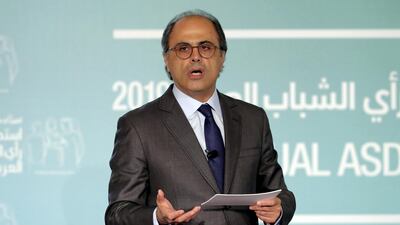Arab leaders should learn from Europe’s recovery from the devastation of World War II to deliver a peaceful region that its youth yearns for, a senior IMF official has said.
Jihad Azour, a former Lebanese finance minister, called for renewed economic cooperation between nations with leaders putting historical differences to one side.
He argued the results of such an entente could be similar to the process of European integration, which delivered decades of peace to a continent ravaged by war.
He also called for a new “social contract” between Arab governments and young people, where leaders ran accountable and transparent governments ensuring economic opportunities for all.
A desire for peace in the region, as well as concern over a lack of job prospects and a high cost of living, were among the major findings of this year’s Arab Youth Survey, which considered thousands of responses from 18 to 24-year-olds across 15 territories and countries.
“The case is made,” Mr Azour said, in response to a question about how the region could put an end to more than half a century of cyclical wars.
“Reducing barriers, improving integration, allowing people to trade on goods and services, create more synergies, is the best way.
“This is what Europe did. Europe was a lost case after the Second World War. What made Europe now one of the safest places in the world was trade integration and economic and cultural exchange.
“I think this is where the region should go. We tried it in the past, maybe it didn’t work well, but that doesn’t mean it’s not the right solution. We need to try again.”
Mr Azour, Lebanese finance minister between 2005 and 2008, became Middle East and Central Asia director for the International Monetary Fund in 2016.
The IMF is made up of 189 countries and seeks to promote financial stability, cross-border trade and reduce poverty globally. It was created in 1945, as part of broader efforts to increase cooperation between nations.
At the Arab Youth Survey launch in Dubai on Tuesday, Mr Azour described youth unemployment as the biggest challenge facing the region.
Around 11 per cent of 15 to 24-year-olds in the UAE are not in education, work or training, according to International Labour Organisation statistics from 2017. The average across the region is far higher – with youth unemployment exceeding 30 per cent in many countries, Mr Azour acknowledged.
The IMF director went on to say he was encouraged that the UAE had been voted the most attractive destination for young people to live, and urged leaders across the region to embrace reform.
“There are frustrations, and I would say there are legitimate frustrations, particularly on the worsening economic reality that young people face,” Mr Azour said of the survey’s results.
“The mother of all priorities for the region is tackling youth unemployment. If there is one cause that all forces and contributors should focus on, it is tackling youth unemployment, which remains alarming. All economic policies fail if they cannot deliver on reducing the unemployment issue.
“The solution is to give opportunities for all, to unleash, embrace, and nurture the talent of the region.
“Sometimes when we hear the word reform in the region it has a negative connotation. It shouldn’t, because this is our effort to make the lives of our kids better."

